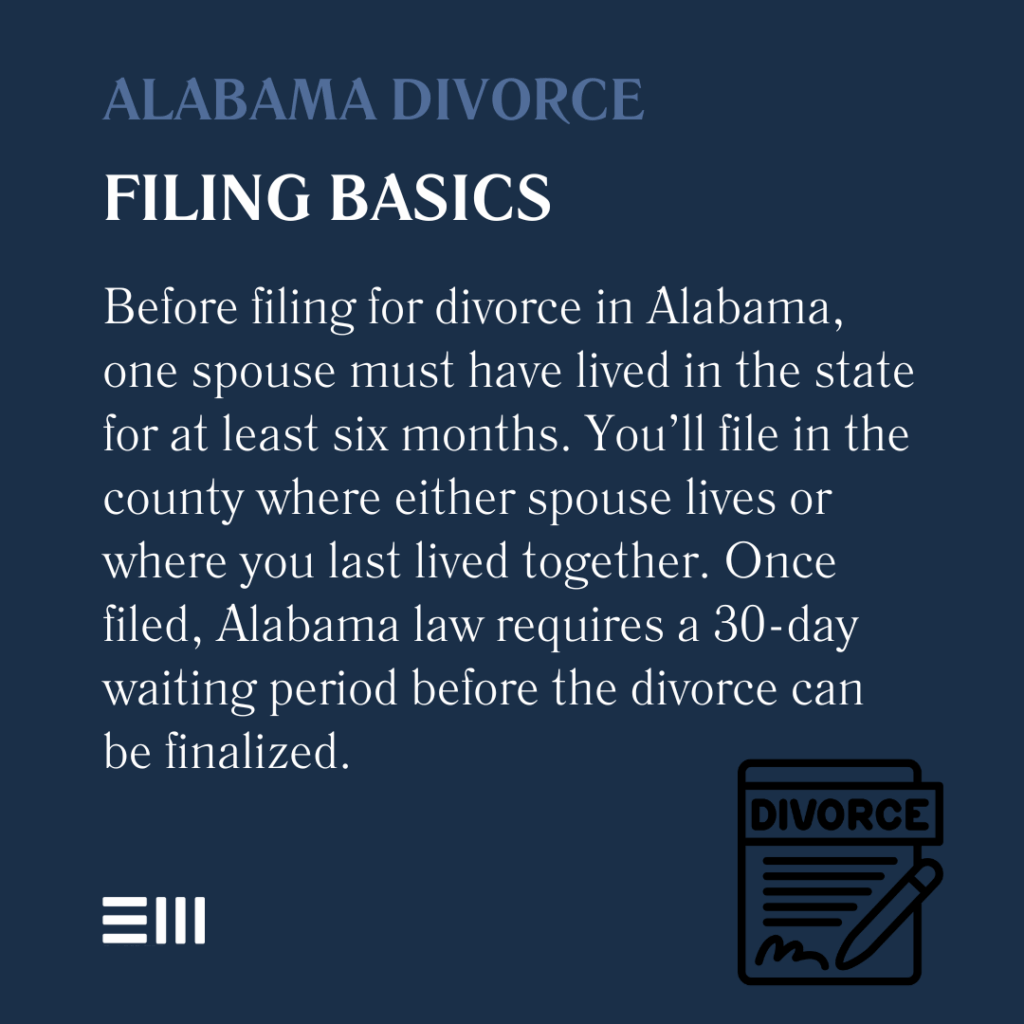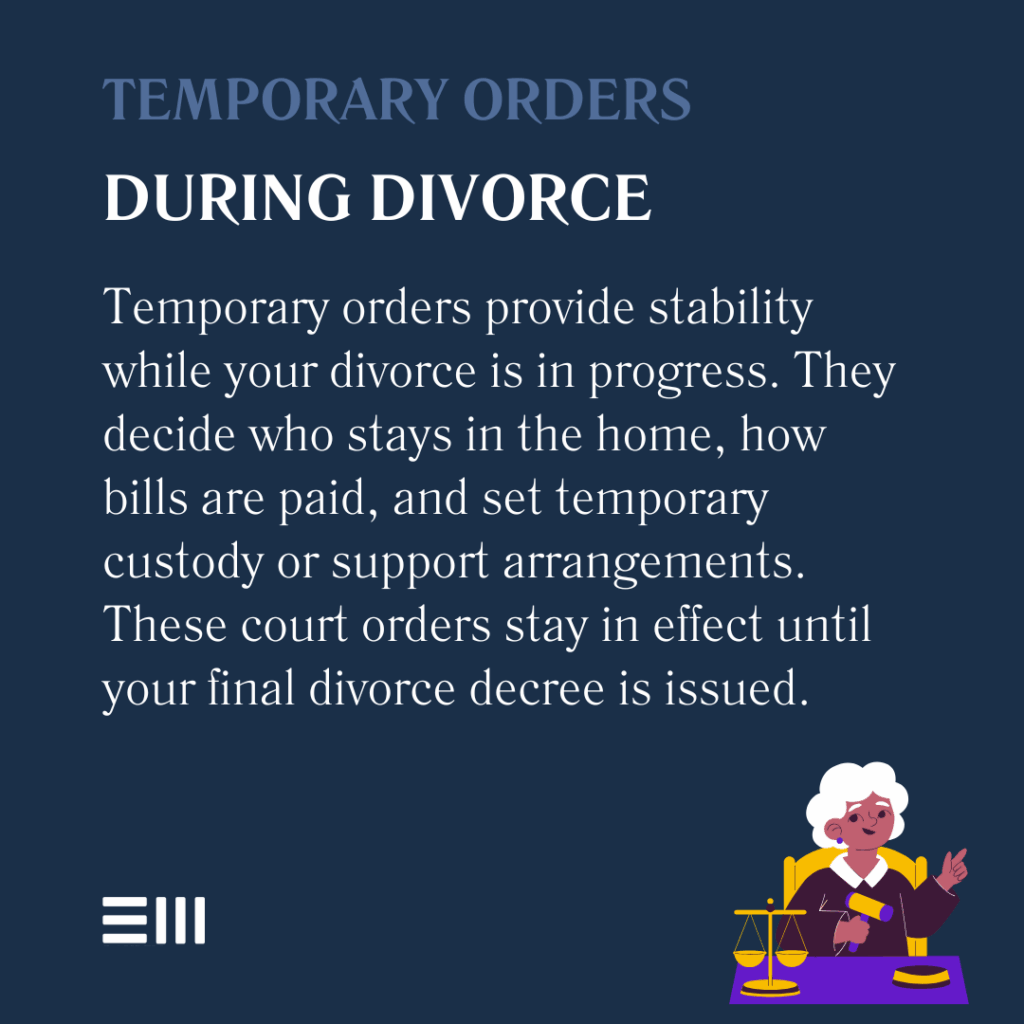
The pen hovers over the paper, your hand trembling slightly as you contemplate signing the lease for your new apartment—the first concrete step toward a life apart from your spouse.
Making the decision to divorce often feels overwhelming, but understanding the process transforms uncertainty into actionable steps. So you want a divorce.
Here’s how to start navigating Alabama’s legal requirements while protecting your interests and preparing for the future ahead.
Understanding Alabama Divorce Requirements
Alabama law establishes specific criteria that must be met before filing for divorce, ensuring the state has proper jurisdiction over your case.
Meeting these requirements prevents delays and complications in your divorce proceedings.
- Residency requirement: One spouse must have lived in Alabama for at least six months.
- County filing: File in the county where either spouse resides or where you last lived together.
- Grounds for divorce: Choose between no-fault (incompatibility) or fault-based grounds.
- Waiting period: Alabama requires a 30-day waiting period after filing.
- Legal separation: Not required before filing for divorce in Alabama.
These foundational requirements establish your eligibility to file for divorce in Alabama and determine where and how to proceed with your case.
For comprehensive guidance on family law matters, consulting with experienced attorneys ensures compliance with all legal requirements.

Preparing Your Initial Documentation
Gathering essential documents before filing streamlines the divorce process and helps your attorney build a comprehensive case.
Organization at this stage saves time and reduces stress throughout the proceedings.
- Financial records: Bank statements, tax returns, pay stubs, and investment accounts.
- Property documentation: Deeds, mortgages, vehicle titles, and appraisals.
- Debt information: Credit card statements, loan documents, and payment histories.
- Marriage certificate: Official copy needed for filing purposes.
- Children’s documents: Birth certificates, school records, and medical information.
Complete documentation provides the foundation for fair asset division and support determinations during your divorce proceedings.
For those who created estate planning documents during marriage, remember to update your will and estate plan after divorce.
Filing Your Divorce Complaint
The divorce process officially begins when you file a complaint with the appropriate Alabama circuit court. Understanding each step ensures proper filing and sets realistic expectations for the timeline ahead.
#1: Initial Filing Steps
Starting your divorce requires completing specific legal documents and following court procedures precisely.
- Complete the complaint: Detail your grounds for divorce and requested relief.
- File with circuit clerk: Submit original documents and required copies.
- Pay filing fees: Alabama filing fees typically range from $200-$300.
- Obtain case number: Receive your official case number for tracking.
- Request summons: Court issues official notice for spouse.
Proper filing initiates the legal process and establishes the framework for all subsequent divorce proceedings.
#2: Serving Your Spouse
Alabama law requires proper notification to your spouse about the divorce filing through formal service procedures.
- Sheriff service: Most common method using local sheriff’s department.
- Private process server: Alternative option for faster service.
- Certified mail: Available if spouse agrees to accept service.
- Publication service: Used when spouse cannot be located.
- Waiver of service: Option if spouse voluntarily accepts papers.
Successful service ensures your spouse receives legal notice and starts the clock on response deadlines.
Navigating Temporary Orders
Temporary orders address immediate needs while your divorce proceeds, providing stability for both parties during the legal process. These orders remain in effect until the final divorce decree replaces them.
- Temporary custody: Establishes children’s living arrangements and visitation.
- Temporary support: Provides financial assistance for spouse and children.
- Property possession: Determines who stays in the marital home.
- Bill payments: Assigns responsibility for ongoing expenses.
- Asset preservation: Prevents disposal of marital property.
Securing appropriate temporary orders protects your interests and maintains household stability throughout the divorce process.
For those dealing with significant assets, high-asset divorce considerations may require additional protective measures.

Understanding Your Options
Alabama offers different paths to divorce, each with distinct advantages depending on your circumstances and relationship dynamics. Choosing the right approach affects both timeline and costs.
- Uncontested divorce: Both parties agree on all terms, fastest and least expensive option.
- Contested divorce: Disagreements require court intervention and negotiation.
- Mediated divorce: Neutral third party helps reach agreements outside court.
- Collaborative divorce: Team approach with attorneys committed to settlement.
- Default divorce: Proceeds when spouse fails to respond to filing.
Understanding these options helps you choose the most appropriate path for your specific situation and goals.
Learn more about the benefits of collaborative divorce in Alabama as an alternative to traditional litigation.
Frequently Asked Questions About Divorce in Alabama
Starting a divorce raises numerous questions about the process, timeline, and potential outcomes in Alabama courts.
How Long Does an Alabama Divorce Take?
Uncontested divorces can finalize in 30-60 days after filing, while contested cases may take six months to several years.
The complexity of asset division, custody disputes, and cooperation between parties significantly impacts timeline.
Most divorces resolve within 6-12 months through negotiation or mediation. For specific county procedures, our Talladega County divorce attorneys can provide localized guidance.
Can I Date During My Divorce?
While Alabama law doesn’t prohibit dating during divorce proceedings, it can complicate matters significantly.
Dating may impact custody decisions, spousal support determinations, and property division if marital assets are spent on a new relationship. Attorneys generally advise waiting until after finalization.
What If My Spouse Won’t Sign the Papers?
Alabama doesn’t require both signatures to proceed with divorce. After proper service, your spouse has 30 days to respond.
Failure to respond allows you to request a default judgment. The divorce proceeds based on your requests, though the court reviews all proposals for fairness. If facing disputes over property division, explore our guide on resolving family disagreements for additional strategies.
How Is Property Divided in Alabama?
Alabama follows equitable distribution principles, dividing marital property fairly but not necessarily equally.
Courts consider factors including marriage length, each spouse’s contributions, economic circumstances, and future earning capacity. Separate property owned before marriage typically remains with the original owner.
Begin Your Fresh Start with Confidence
So you want a divorce. Here’s how to start: take the first step by consulting with knowledgeable legal counsel who understands Alabama divorce law and your unique circumstances.
Our experienced divorce attorneys here at Baxley Maniscalco guide clients through every stage of the divorce process, from initial filing through final decree.
We protect your interests while working toward efficient resolutions that allow you to move forward with your life.
Whether you’re in Anniston, Oxford, or Talladega, contact us today to schedule your confidential consultation and discover how we can help you navigate this challenging transition with clarity and support.
Can't find what you're looking for? Search our site below.










